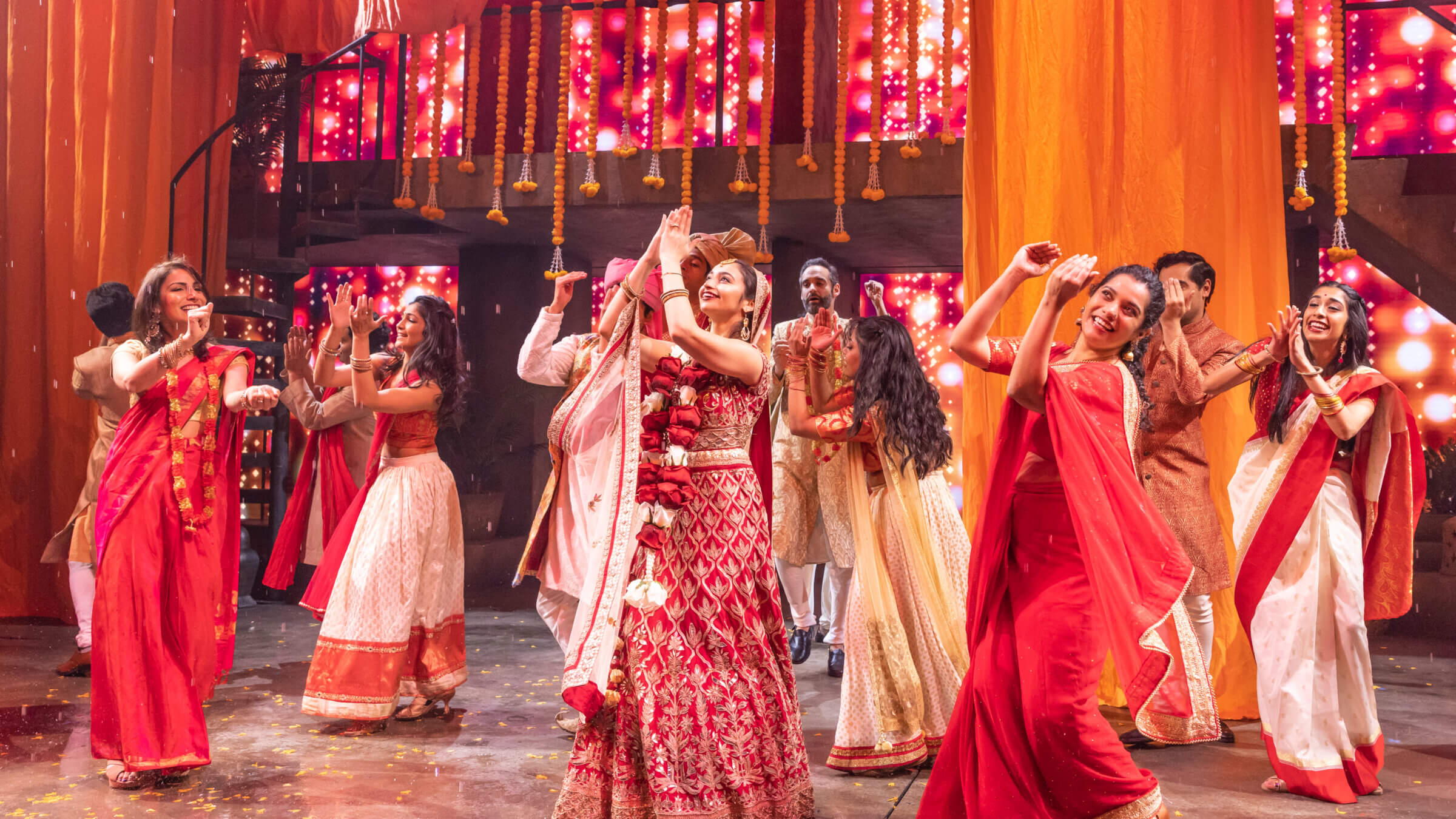Director Mira Nair wanted an Indian ‘Fiddler on the Roof.’ The result: ‘Monsoon Wedding, The Musical’
A theatrical adaptation of the hit film ‘Monsoon Wedding’ ends its run this weekend in Brooklyn

A scene from the musical Monsoon Wedding, which runs through June 25 at St. Ann’s Warehouse in Brooklyn, N.Y. Photo by Matthew Murphy
The Indian director Mira Nair made a feature film in 2001 called Monsoon Wedding, about an arranged marriage between a groom from the U.S. and a bride from Delhi. The movie was a hit, grossing more than $30 million worldwide and winning a Golden Lion award at the Venice Film Festival.
But Nair longed to bring the story, which she says “winked at Bollywood” but was “absolutely not” a Bollywood film, to the theater. Eventually she got her wish. A staged musical of Monsoon Wedding was first produced in 2017 in Berkeley, California, and it’s been running since early May at St. Ann’s Warehouse in Brooklyn, New York.
The program for the Brooklyn show includes a letter from Nair in which she cites inspiration from a classic Jewish musical. “Why can’t we have our own Fiddler on the Roof?” she wrote.
Monsoon Wedding ends its New York run Sunday, but Nair spoke by phone about future plans for the show, why Fiddler offers such a powerful model for storytelling, why she declined an invitation to Israel and more.
This interview has been lightly edited for length and clarity.
What did you mean when you wrote: “Why can’t we have our own Fiddler on the Roof?”
Fiddler on the Roof is a thing we also grew up with. It’s about family and tradition, and the push and pull of so many human stories. It’s entirely relatable, and so specific and local, and yet it’s become utterly universal.
I came from the stage. Before I was a film director, I was an actor. The stage was not a foreign place. It was more of a home to me. I never made a musical before, but I wanted to bring Monsoon Wedding to the stage. I wanted to tell it right and I wanted to tell it our way. I use the analogy of Fiddler in the sense that, so much of our story is rooted in tradition, rooted in culture, and yet the human families’ dilemmas and struggles, in different contexts, are essentially the same — deeply human. No matter where they come from, people see themselves in those stories.
I use Fiddler by way of analogy, not imitation. The Jewish community has Fiddler; what about the Punjabi community? They are the party animals of India!
I take it you’ve seen the movie version of Fiddler. Have you seen it on stage?
Yes, a couple of times. I have not seen the Yiddish one — I wanted to. I heard it was fantastic but I wasn’t here then.
Some of Monsoon’s co-producers were also producers of the off-Broadway production of Fiddler in Yiddish. Was that a coincidence?
Yes. But Steve and Ruth Hendel, who have done several Tony Award-winning shows including FELA (and who were producers of Yiddish Fiddler), have been with me from the beginning. It’s been such a joy because they understand the show and its impact on people. They’ve nourished my authentic voice. We wanted to know the canon of the Broadway musical — and we do — but still not lose our soul. It has to be about what makes us who we are.
All of the cast members for Monsoon are either from the subcontinent or trace their heritage to that part of the world. Was it challenging to find performers for this production?
When we began the first show in 2017 in Berkeley, we had a hard time casting. There was not enough of a pool of experience in this field that we could locate. But for this show, five actors are now from India. The rest, 75%, are all North American.
The day I saw the show, the theater was full and the audience was quite diverse, which you don’t always see in New York theaters. Has it been tough to get New York audiences to come out for the show?
Not at all! When I go to see it, often I do not have a seat for myself!
Are there plans for future productions?
We have many, many plans in the pipeline. You don’t do such a thing and let it disappear. We are opening in India in spring 2024 and intending to open on Broadway in 2025.
In 2013, you declined an invitation to visit Haifa, saying you would go to Israel “when occupation is gone” and “when the state does not privilege one religion over another.” Is that still your position?
I still hold my principles.























